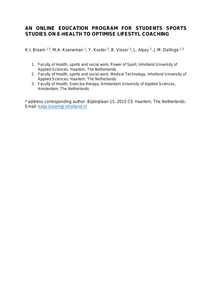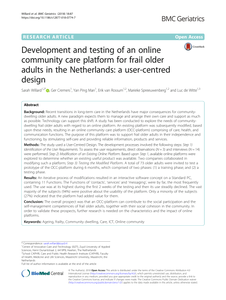In de eerste twee delen van het proefschrift vindt u informatie over online opvoedingsondersteuning in het algemeen. Welke studies zijn daarover gepubliceerd? Hoe zien de onderzochte online programma’s voor ouders eruit? Welke kenmerken hebben ze? Hoe effectief zijn ze? In de drie andere delen gaan we dieper in op het eenmalig e-mailconsult. Er zijn veel organisaties in Nederland die ouders de gelegenheid bieden om een advies per e-mail te ontvangen, vaak via een web-formulier of een button op een website. Kunnen beroepskrachten deze vorm van online communicatie gebruiken om ouders te begeleiden naar méér empowerment? In deze brochure leest u een beknopte samenvatting van het proefschrift.
DOCUMENT

In dit abstract wordt de ontwikkeling van een online onderwijsmodule beschreven gericht op eHealth voor leefstijlverbetering
MULTIFILE

We set out to bring into being a Creative Methods issue to inform and support researchers, practitioners, educators, and those they serve. We did so with what William Blake called “a firm persuasion” (Whyte, 2001, p. 3), and in the process of expanding the vidence-base for creative methods in guidance and counselling we are affirmed that this is both essential and rewarding. In our call for papers, we identified a number of reasons that creative methods are essential to guidance and counselling; for instance, they reintroduce playfulness, which is an often-undervalued capacity of humans that can help create space to respond to serious questions. Creative methods also allow us to be less resistant to so-called “negative” feelings and they let us break rank with the rational linear thinking, planning, efficiency and goal-orientation that has dominated policy and some practice discourses. In essence, this has supressed the creative, sensory and feeling side of human needs and behaviours. Indeed a common theme that appeared in all the articles is the importance of making room for the affective, before connecting that with more cognitive articulations. “This is an Accepted Manuscript of an article published by Taylor & Francis in "British Journal of Guidance and Counselling" on 05/14/16, available online: https://doi.org/10.1080/03069885.2018.1442917. LinkedIn: https://www.linkedin.com/in/reinekke-lengelle-phd-767a4322/
MULTIFILE

Internet technology offers a lot of new opportunities for the dissemination of information, sharing of support and consultation of professionals. Innovating professionals from multiple disciplines have begun to exploit the new opportunities for parenting support. The studies presented in this book are meant to deepen our insights in the subject of online parenting support and investigate the feasibility to use single session email consultation to empower parents. This publication includes: - A systematic review of 75 studies on online parenting support. - A meta-analytic review of 12 studies on online tools to improve parenting. - A content analysis of 129 parenting questions and responses in single session email consultation. - An analysis and validation study of the newly developed Guiding the Empowerment Process model. - An evaluation study of the effects of single session email consultation on parental empowerment. The results of this research indicate that the Internet is not only a source of information, but it can also be an instrument for support and training, aiming to improve parental competencies.
MULTIFILE

Development of an online education program for students sports studies on e-health to optimise lifestyle coaching
DOCUMENT

Background. A number of parenting programs, aimed at improving parenting competencies,have recently been adapted or designed with the use of online technologies. Although webbased services have been claimed to hold promise for parent support, a meta-analytic review of online parenting interventions is lacking. Method. A systematic review was undertaken of studies (n= 19), published between 2000 and 2010, that describe parenting programs of which the primary components were delivered online. Seven programs were adaptations of traditional, mostly evidence-based, parenting interventions, using the unique opportunities of internet technology. Twelve studies (with in total 54 outcomes, Ntot parents = 1,615 and Ntot children = 740) were included in a meta-analysis. Results. The meta-analysis showed a statistically significant medium effect across parents outcomes (ES = 0.67; se = 0.25) and child outcomes (ES = 0.42; se = 0.15). Conclusions. The results of this review show that webbased parenting programs with new technologies offer opportunities for sharing social support, consulting professionals and training parental competencies. The meta-analytic results show that guided and self-guided online interventions can make a significant positive contribution for parents and children. The relation with other meta-analyses in the domains of parent education and web-based interventions is discussed.
DOCUMENT

Background: Recent transitions in long-term care in the Netherlands have major consequences for community- dwelling older adults. A new paradigm expects them to manage and arrange their own care and support as much as possible. Technology can support this shift. A study has been conducted to explore the needs of community- dwelling frail older adults with regard to an online platform. An existing platform was subsequently modified, based upon these needs, resulting in an online community care platform (OCC-platform) comprising of care, health, and communication functions. The purpose of this platform was to support frail older adults in their independence and functioning, by stimulating self-care and providing reliable information, products and services. Methods: The study used a User-Centred Design. The development processes involved the following steps: Step 1) Identification of the User Requirements. To assess the user requirements, direct observations (N = 3) and interviews (N = 14) were performed. Step 2) Modification of an Existing Online Platform. Based upon Step 1, available online platforms were explored to determine whether an existing useful product was available. Two companies collaborated in modifying such a platform; Step 3) Testing the Modified Platform. A total of 73 older adults were invited to test a prototype of the OCC-platform during 6 months, which comprised of two phases: (1) a training phase; and (2) a testing phase. Results: An iterative process of modifications resulted in an interactive software concept on a Standard PC, containing 11 Functions. The Functions of ‘contacts’, ‘services’ and ‘messaging’, were by far, the most frequently used. The use was at its highest during the first 2 weeks of the testing and then its use steadily declined. The vast majority of the subjects (94%) were positive about the usability of the platform. Only a minority of the subjects (27%) indicated that the platform had added value for them. Conclusion: The overall prospect was that an OCC-platform can contribute to the social participation and the self-management competencies of frail older adults, together with their social cohesion in the community. In order to validate these prospects, further research is needed on the characteristics and the impact of online platforms.
MULTIFILE

The purpose of this paper is to reflect on the experiences of safety and security management students, enrolled in an undergraduate course in the Netherlands, and present quantitative data from an online survey that aimed to explore the factors that have contributed to students’ satisfaction with, and engagement in, online classes during the COVID-19 pandemic. The main findings suggest an interesting paradox of technology, which is worth further exploration in future research. Firstly, students with self perceived higher technological skill levels tend to reject online education more often as they see substantial shortcomings of classes in the way they are administered as compared to the vast available opportunities for real innovation. Secondly, as opposed to democratising education and allowing for custom-made, individualistic education schedules that help less-privileged students, online education can also lead to the displacement of education by income-generating activities altogether. Lastly, as much as technology allowed universities during the COVID-19 pandemic to continue with education, the transition to the environment, which is defined by highly interactive and engaging potential, may in fact be a net contributor to the feelings of social isolation, digital educational inequality and tension around commercialisation in higher education.
MULTIFILE

Background: There is still limited evidence on the effectiveness and implementation of smoking cessation interventions for people with severe mental illness (SMI) in Dutch outpatient psychiatric settings. The present study aimed to establish expert consensus on the core components and strategies to optimise practical implementation of a smoking cessation intervention for people treated by Flexible Assertive Community Treatment (FACT) teams in the Netherlands. Design: A modified Delphi method was applied to reach consensus on three core components (behavioural counselling, pharmacological treatment and peer support) of the intervention. The Delphi panel comprised five experts with different professional backgrounds. We proposed a first intervention concept. The panel critically examined the evolving concept in three iterative rounds of 90 min each. Responses were recorded, transcribed verbatim and thematically analysed. Results: Overall, results yielded that behavioural counselling should focus on preparation for smoking cessation, guidance, relapse prevention and normalisation. Pharmacological treatment consisting of nicotine replacement therapy (NRT), Varenicline or Bupropion, under supervision of a psychiatrist, was recommended. The panel agreed on integrating peer support as a regular part of the intervention, thus fostering emotional and practical support among patients. Treatment of a co-morbid cannabis use disorder needs to be integrated into the intervention if indicated. Regarding implementation, staff’s motivation to support smoking cessation was considered essential. For each ambulatory team, two mental health care professionals will have a central role in delivering the intervention. Conclusions: This study provides insight into expert consensus on the core components of a smoking cessation intervention for people with SMI. The results of this study were used for the development of a comprehensive smoking cessation program.
DOCUMENT

Cancer and its treatments cause significant changes in sexuality that affect the quality of life of both patients and their partners. As these issues are not always discussed with healthcare professionals, cancer patients turn to online health communities to find answers to questions or for emotional support pertaining to sexual issues. By using a discursive psychological perspective, we explore the social actions that participants in online health forums perform when discussing sexuality. Data were collected by entering search terms in the search bars of three online health forums. Our analysis of 213 threads, containing 1,275 posts, provides insight into how participants who present themselves as women with cancer account for their sexual issues and, in doing so, orient to two intertwined norms: Having untroubled sex is part of a couple’s relationship, and male partners are entitled to having untroubled sex. We discuss the potential harmful consequences of orienting to norms related to sexual behaviour. Yet, our findings can also help healthcare professionals in broaching the topic of sexuality in conversations with cancer patients. The insights of this study into what female patients themselves treat as relevant can assist health professionals in better aligning with patients’ interactional concerns.
DOCUMENT
